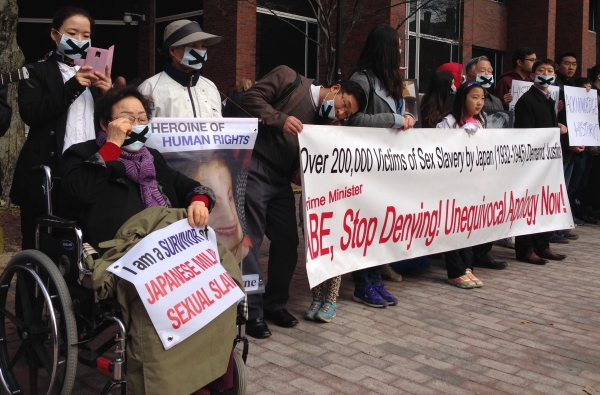
On Oct. 3, former Japanese Prime Minister Yukio Hatoyama visited the atomic bomb victims living in Hapcheon County and kneeled to apologize to them. Hatoyama is considered one of the ‘pro-Korean groups’ in Japanese politics. Since his retirement, Hatoyama has harshly criticized the current Prime Minister, Abe Shinzo, about his visits to the Yasukuni Shrine and has asserted that Japan should acknowledge and compensate for the Japanese Military Sexual Slavery. This contrasts with many high-ranking officials, who usually have an aggressive stance against Korea.
It’s been a long time since the Japanese colonial period, but South Korea still suffers from unsolved problems and the scars that have been left behind. What the majority of Koreans want from Japan is not just monetary compensation but a genuine apology. On the contrary, however, Japan has just made self-defense remarks about the numerous atrocities it committed and has made absurd remarks further hurting the victims’ hearts. Their ludicrous statements are usually concerning the Japanese Military Sexual Slavery Victims, the Japanese occupation, and forced labor on Hashima Island, Dokdo, etc.
During the World War II, the Japanese government created a military comfort zone to satisfy the sexual needs of the Japanese soldiers and recruited women from colonies and occupied territories through false job recruiting or compulsory mobilization. The victims are still suffering from this war crime. However, in 1997, the current Japanese prime minister Abe said that “There were ‘gisaeng houses’ at Korea, so prostitution was just a daily thing.” and in 2005, he also said that “Japanese Military Sexual Slavery Victims are just made up. It’s just a leak from a made-up story from the Japanese media.” He spoke of Japan’s war crimes as if they was nothing at all.
Absurd statements about Dokdo, a Korean island, were made too. Dokdo is a Korean territory, but Japan is consistently arguing that Dokdo is theirs and even made a Japanese expression ‘Takeshima’ for it. In 2012, Former Japanese prime minister, Yoshihiko Noda made absurd remarks about Dokdo saying that “Dokdo is under illegal occupation by the Korean government and President Lee Myung-bak visiting Dokdo is an illegal landing.” In 2011, former foreign minister Takeaki Matsumoto stated, “If Takeshima were to be attacked by a missile it would be an attack on Japan.”
Presently, it’s not just government officials that are displaying such attitudes. The ‘Rising Sun Flag’, a symbol of Japanese misdeeds appeared most recently in the World Cup Stadiums. The flag in question emerged in the second match of Group H between Japan and Senegal at the 2018 Russia World Cup. Even though FIFA strictly prohibits political action in the stadium, scenes of Japanese fans waving the flag vigourously weres caught on camera and broadcasted. However, it must be emphasized that not all Japanese people show such an attitude, demonstrated from the former Japanese Prime Minister Yukio Hatoyama’s visit to Hapcheon County.
Just recently the issue of the ‘Rising Sun Flag’ appeared once again concerning the Republic of Korean International Fleet Review. For the event, the South Korean Navy delivered an official letter to 14 participating countries including Japan, stating that raising the Korean flag with their own flag is the basic principle. It was an indirect request to Japan, not to raise the ‘Rising Sun Flag’. However, the Japanese Ministry of Defense and the Japanese Self-Defense Forces leadership stated that it’s the law to raise the national flag and insisted on raising the flag in question.
Another big issue is the government officials’ visit to Yasukuni Shrine. Yasukuni Shrine is a place to commemorate the 2.46 million people who died during war. The problem is that amongst those 2.46 million, there are 14 Class A war criminals from the Pacific War. The simple action of visiting the shrine conveys the message that visitors have no remorse concerning the misdeeds Japan carried out during the Pacific War, including all that was done to South Korea.


